Powered by Bestia Europe B.V.
How Long Do Poodles Live? Tips For a Healthy Lifespan
Poodles, with their eye-catching curls, spunky spirit, and high intelligence, are one of the most iconic dog breeds in the world.
If you’re lucky enough to have one of these fuzzy bundles of joy in your life, you might wonder about the Poodle lifespan and what you can do to extend it.
The good news is Poodles are among the longest-living dog breeds, with an average lifespan of 10 to 13 years,1 although this depends on individual lifestyle and genetics.
Here’s what you need to know to keep your Poodle pal at your side for years to come.
Types of Poodles
Poodles come in three varieties, with size being the main difference between them:
- Standard Poodles are at least 15 inches tall and weigh between 40 to 70 pounds. Originally bred as water retrievers, standard Poodles possess a friendly and enthusiastic temperament and are renowned for their natural athleticism.
- Miniature Poodles share many traits with the standard Poodle, but humans bred them to be smaller than the standard Poodle (10 to 15 inches high, and 10 to 15 pounds). The small stature of the miniature Poodle makes them ideal pets for cramped quarters, such as urban apartments.
- Toy Poodles measure less than ten inches high and weigh in at only 4 to 6 pounds. They are popular as fun-size travel companions and make excellent playmates for children.
Beyond size differences, the miniature Poodle and toy Poodle dog breed tends to have lower energy and higher anxiety compared to standard Poodles. You may need to take a slightly milder approach when socializing smaller Poodles than a standard.
In general, all three Poodle puppy varieties have a long life expectancy and face similar health challenges.
What Determines Poodle Lifespan?
Every Poodle is unique, but certain factors contribute the most to a long and healthy life expectancy:
- Strong genes predisposed to longevity
- Regular exercise
- Balanced diet
- Routine checkups
- Social stimulation
Taking the time to understand how these factors work together can help you be the kind of paw parent your fuzzy friend needs to reach a ripe old age.
#1 Strong Genes
As we mentioned before, humans originally bred Poodles to retrieve waterfowl. This breeding makes Poodles excellent athletes. They often excel in feats of agility (for centuries, they were popular as circus performers),1 and possess sharp minds and friendly temperaments.
This top-shelf pedigree means that Poodles possess robust genetics—great news for all you Poodle paw parents out there!
Despite their solid genes, Poodles are still prone to a few common genetic ailments2:
- Hip dysplasia – This is a genetic issue that arises when the hip joint fails to fuse properly, leading to a loose joint. Because the bones don’t fit together perfectly, they grind against each other. Over time, this constant friction may cause inflammation and arthritis.
- Idiopathic epilepsy – A genetic neurological disorder, idiopathic epilepsy triggers occasional seizures (usually lasting under a minute). Medication can help control and reduce the severity of seizures.
- Addison’s disease – Sometimes known as “the great imitator,” symptoms of Addison’s disease can mimic those of conditions like inflammatory bowel disease and kidney failure. Thankfully, Addison’s is easily treatable with monitoring and regular medication.
- Skin issues – Because they have thick fur, Poodles are prone to skin ailments like allergic skin disease and sebaceous cysts. The best prevention for Poodle skin problems is proper coat care. Products like Vetericyn FoamCare Medicated Pet Shampoo can help maintain sleek and healthy fur.
Don’t let any of these Poodle dog health issues worry you—proper care and attention can help lessen the effects of these genetic conditions if they pop up.

#2 Regular Exercise
Just like humans, Poodles require plenty of exercise (at least 60 minutes per day)3 to stay in tip-top shape. Getting a daily dose of high-octane activity contributes to a healthy weight, boosts cardiovascular health, and strengthens joints and muscles—all key ingredients to a long life!
Too much exercise can be counterproductive, so be sure to keep the intensity within a range they can comfortably handle.
Some ideas for fun activities to keep your Poodle in their prime pet health:
- Walks
- Jogging
- Fetch
- Dog sports (like agility and obedience training)
- Swimming (better for standard Poodles)
If your Poodle is still a puppy (savor all the cuteness while you can), it’s best to avoid lengthy walks or super high-impact exercise until they reach full development (around 12 to 18 months).
#3 Balanced Diet
You don’t win best-in-show by eating junk! A balanced diet, rich in protein, carbs, and healthy fat, is crucial in the quest for a lengthier Poodle’s lifespan.
A few suggestions for crafting your paw partner’s diet:
- Choose high-quality food – Not all pet food is created equal. Go with brands that feature organic ingredients and include all essential dog nutrition. For Poodle pups, choose food specifically formulated for puppies.
- Steer clear of people chow – You know the look: those cute little “please feed me” eyes gazing up at you. Don’t fall for it though. Sharing human food with your Poodle can contribute to obesity, diarrhea, and pancreatitis.
- Add quality supplements – Once you’ve established a solid foundation, consider taking your Poodle’s nutrition to the next level with supplements likeALL-IN 1 by Vetericyn, which supports all-around health.
You’ll also want to keep an eye out for food sensitivities and allergies. If any symptoms appear, such as gastric distress or skin reactions, consult your veterinarian.
#4 Routine Checkups
Even the most vigilant paw parent might miss the warning signs of potential Poodle health issues, so it’s important to get a pair of expert eyes on your Poodle from time to time.
During a checkup, your veterinarian will assess your Poodle’s:
- Overall health – Is your Poodle moving easily? How is their weight?
- Eyes – Are there signs of glaucoma or high blood pressure?
- Ears – Does the ear canal show symptoms of infection?
- Teeth – Any bad breath or tooth decay?
- Chest and abdomen – Does your Poodle have heart murmurs or breathing issues?
While it is not necessary to perform blood work at every checkup, an occasional blood panel can help detect anemia and blood-borne parasites like heartworm.
#5 Social Stimulation
In humans, research shows that robust social connections may increase our longevity by up to 50%.4
There’s no reason to think dogs are any different.
Social interaction helps protect your pup from the effects of stress and anxiety. It also stimulates their lively minds and bodies.
It’s best to get started socializing when your Poodle is a puppy, but it’s never too late to find your Poodle some pals!
Here’s a few ways to get them some quality time with their fellow tail-waggers:
- Attend training classes – Because they are highly intelligent, most Poodles love obedience games, and they’ll jump at the chance to rub noses with other dogs.
- Set up playdates – Put the word out that you are looking to find your pup some buddies. Chances are there are a few dog parents in your circle who would love to get together.
- Let them be social – If your Poodle appears eager to approach another dog, encourage them and help them navigate the interaction.
Although many Poodles display a bubbly personality around their family, they might be a little shy when first meeting strangers. Simply allow them to get used to your guests and they should warm up in no time.
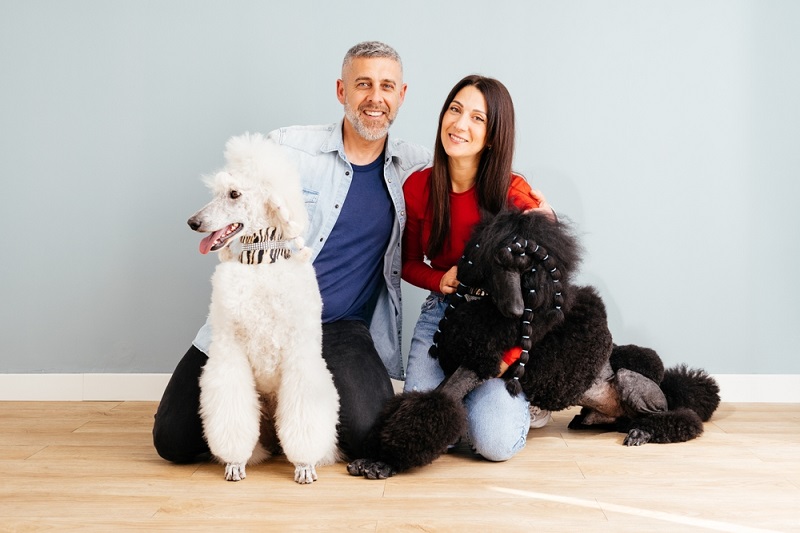
Signs of Aging in Poodles
A happy, well-fed, and socialized Poodle has excellent odds of living well over a decade. This doesn’t mean that Poodles are immune from the effects of aging, however.
Here are some clues your pup may be slowing down a bit5:
- Difficulty seeing – Vision loss is common as dogs age.
- Trouble moving – You may notice your Poodle moving slower or struggling with stairs.
- Change in weight – Older dogs become less active and may gain weight as a result.
- Fear of familiar objects – This can be a sign of mental aging, or an effect of vision loss.
- Drop in energy – Older dogs may sleep more and display less enthusiasm.
If you notice any of these symptoms, you should get them to the vet to rule out any underlying health conditions.
How to Care for an Older Poodle
Aging is natural, and it doesn’t mean that your furry friend can’t still enjoy an amazing quality of life. Take the following steps to accommodate their gray-whiskered ways:
- Stabilize their environment – Avoid sudden changes to furniture layout, as this may confuse a Poodle whose vision isn’t what it used to be.
- Provide mental stimulation – We humans love to say, “Use it or lose it”, and this applies equally to Poodles. Keep their minds sharp with games, puzzles, and toys.
- Keep them active – While it’s important not to overdo it, keeping your Poodle active, even if it’s just a short daily walk, will help keep their bodies strong and flexible.
Support Your Poodle Pal For Life, With Vetericyn
We hope this has helped clarify the Poodle lifespan and how you can ensure your Poodle receives the long and joyful life they deserve.
At Vetericyn, we understand that caring for a pet is like caring for a family member. That’s why we’ve crafted a top-notch roster of animal wellness products designed to bolster overall health and keep your furry friend thriving from puppy to senior canine.
Explore our collection today!
Sources:
- ASPCA Pet Insurance. All About Poodles. https://www.aspcapetinsurance.com/resources/Poodles/
- Walkin’ Pets Blog. 5 Health Conditions Poodles Are At Risk For. https://www.walkinpets.com/blog/Poodle-health-conditions/
- AllPoodleInfo. Poodle Exercise Requirements. https://www.allPoodleinfo.com/Poodle-exercise
- Stanford Lifestyle Medicine. How Social Connection Supports Longevity. https://longevity.stanford.edu/lifestyle/2023/12/18/how-social-connection-supports-longevity/
- American Kennel Club. Aging in Dogs: Physical and Mental Signs Your Dog is Getting Older. https://www.akc.org/expert-advice/health/aging-in-dogs-physical-mental-signs/
Refine by
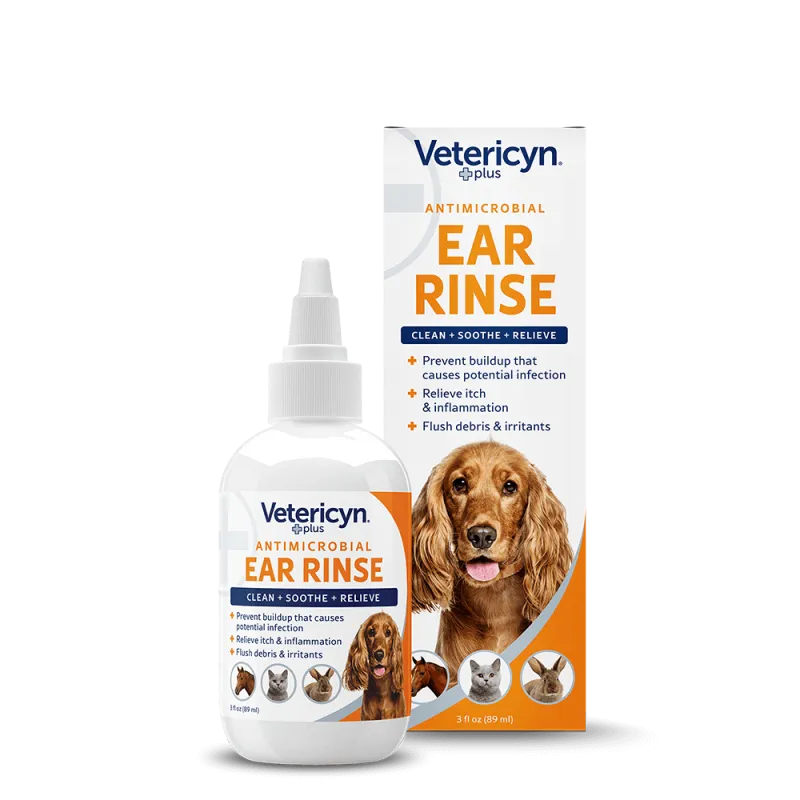
Vetericyn Plus All Animal Ear Rinse
Vetericyn Plus All Animal Ear Rinse
Remove unwanted substances. Relieves itching and irritation. Cleanses ears and removes odor.
€13,18
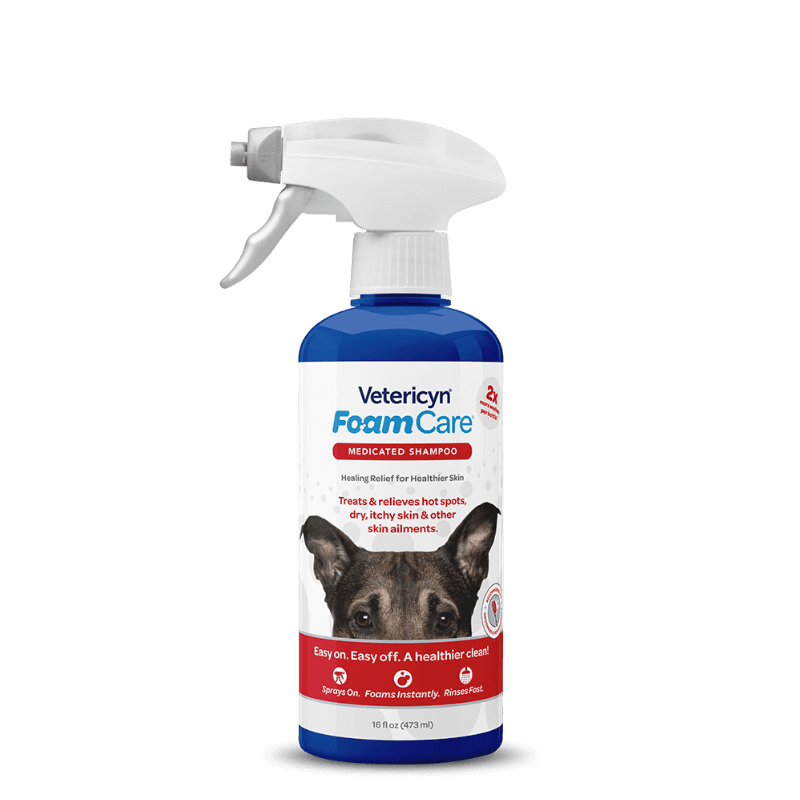
Vetericyn FoamCare Medicated Pet Shampoo
Vetericyn FoamCare Medicated Pet Shampoo
Itching - Hot spots - Dry skin - Dermatitis - Other skin ailments
€23,10
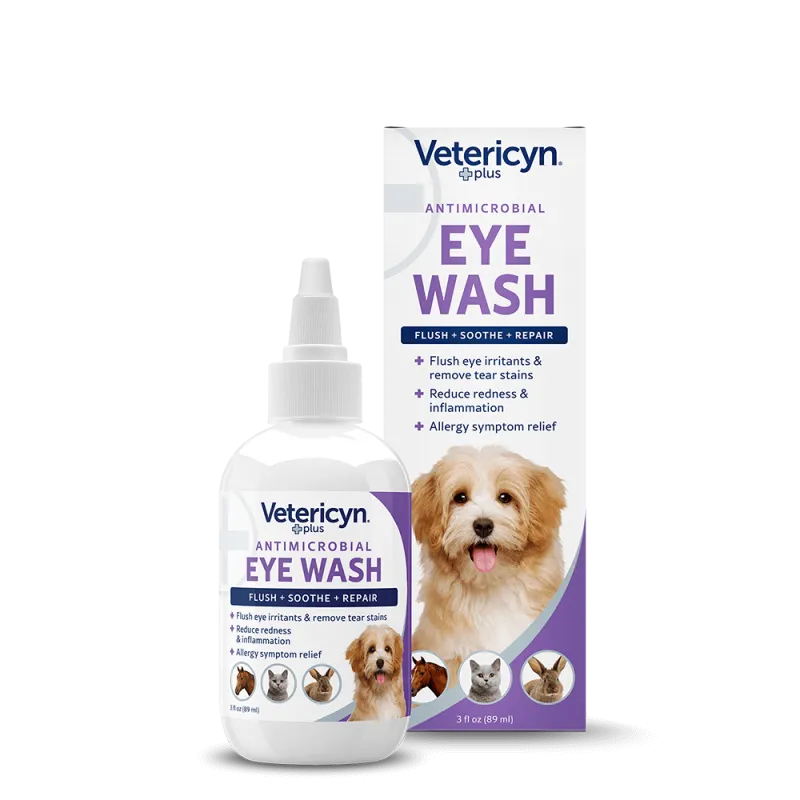
Vetericyn Plus All Animal Antimicrobial Eye Wash 90 mL
Vetericyn Plus All Animal Antimicrobial Eye Wash 90 mL
Rinse and cleanse the eyes. Relief from allergy symptoms. Cleansing of tear stains. Effective in eye disorders.
€13,18
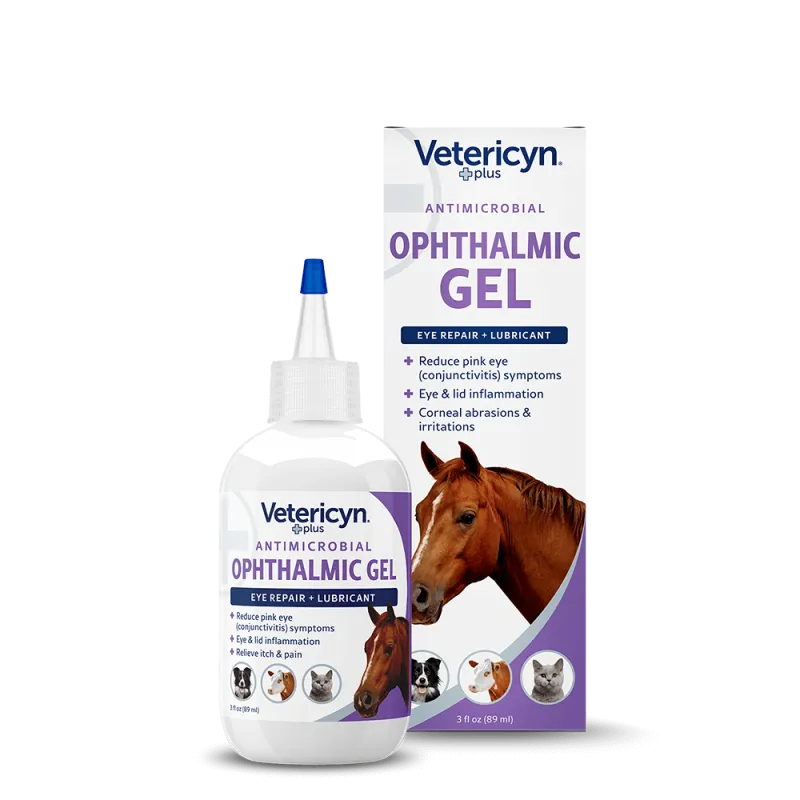
Vetericyn Plus All Animal Antimicrobial Ophthalmic Gel
Vetericyn Plus All Animal Antimicrobial Ophthalmic Gel
Relieve itch and pain caused by allergies, scratched or inflamed corneas, and to reduce pink eye symptoms.
€14,83
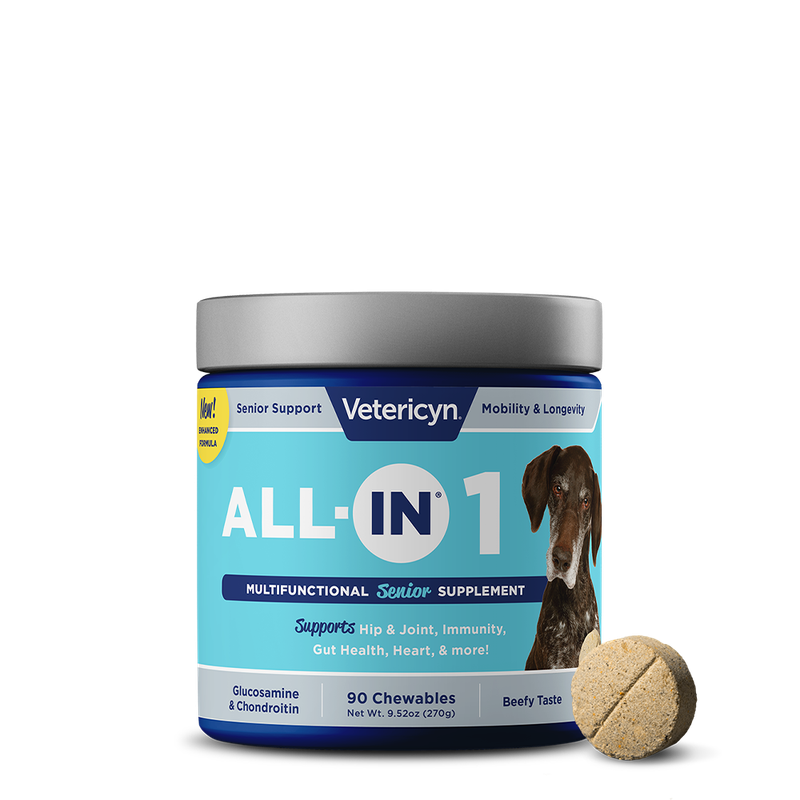
Vetericyn ALL-IN Senior Dog Supplements
Vetericyn ALL-IN Senior Dog Supplements
Mobility and rejuvenation. A formula protected by 8 patents. Proven absorption of the ingredients.
€28,88
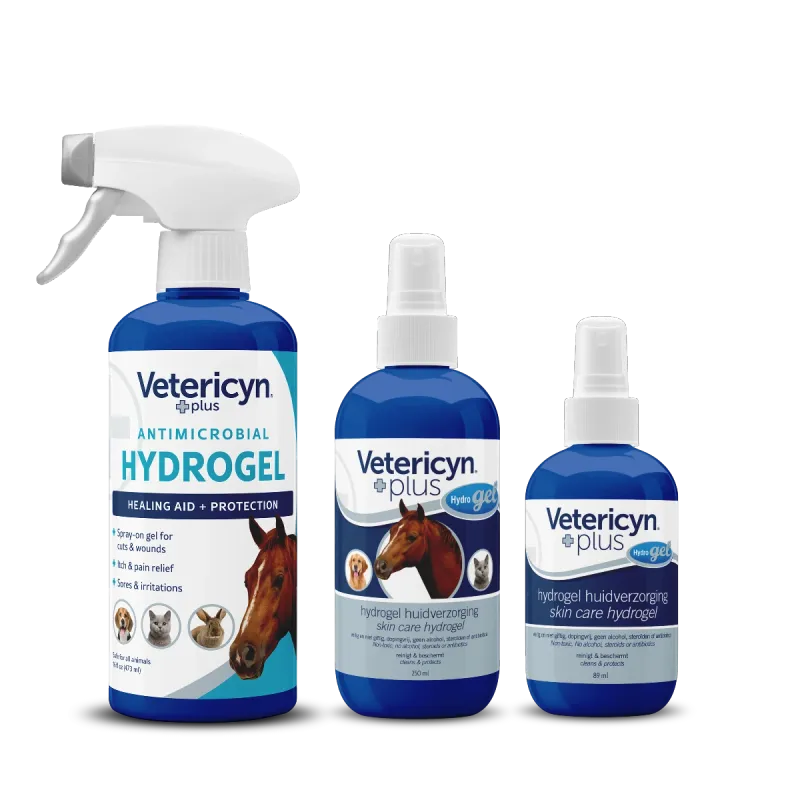
Vetericyn All Animal HydroGel Spray
Vetericyn All Animal HydroGel Spray
Soothing care for skin localized itching and skin problems.
€16,95
Display prices in:EUR
